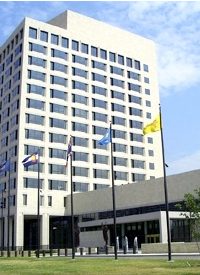
As we approach the Christmas holiday, Christians in Oklahoma are celebrating a rare victory in the battle for religious freedom. The Blaze reports, “The Federal Reserve has reversed its decision that originally forced a small Oklahoma bank to remove from its premises and website Bible verses, crosses, and Christmas buttons.”
A week ago, the Payne County Bank was ordered by the Kansas City Federal Reserve Bank to remove the religious symbols and Christmas displays from its facility. Payne County Bank was told that it could not display crosses or post a Bible “verse of the day” on its website, and that employees could no longer wear pins that read “Merry Christmas, God With Us.” According to a Kansas City Fed examiner, the items could be perceived as discriminatory and violate fair lending.
The Blaze writes, “The Fed told the bank its Christian symbols violated the discouragement clause of Regulation B of the bank regulations. The clause prohibits “…the use of words, symbols, models, and other forms of communication…[that] express, imply, or suggest a discriminatory preference or policy of exclusion.’ Federal examiners interpreted that to mean the bank’s overtly Christian message could offend people of other faiths.”
Addressing the Fed’s defense of the ban, Michael Snyder of Benzinga — a trading website — articulated a number of concerns:
So if any expression of Christianity is ‘an appearance of discrimination,’ will federal officials soon use all of the federal ‘anti-discrimination laws’ already on the books to ban all expressions of Christianity in all private businesses throughout the United States?
… It is absolutely crucial to note that the local bank in Perkins is not a government building. Federal Reserve agents are telling private business owners how they can express themselves as they run their privately-owned business on private property.
Regardless of the constitutionality of the Fed’s ban, the bank immediately complied with the Federal Reserve’s demands.
However, the ban provoked fierce national public outcry, prompting the local bank to post on its website, “We appreciate the generous outpouring of support and prayers of Americans all over the country.”
Likewise, two members of the state’s congressional delegation interceded: U.S. Senator Jim Inhofe and Representative Frank Lucas, both Republicans.
In a letter addressed to Federal Reserve Chairman Ben Bernanke, Inhofe and Lucas demanded that the ban be reversed. The letter indicated that the two had “seldom encountered a more alarming case of heavy handed interpretation and enforcement of federal regulations.” It also charged the Federal Reserve with violating “fundamental Constitutional protections.”
Inhofe posted these remarks on his website:
This is an all out assault on the faith, values, and rights of the bank, its employees and the people of Perkins they serve. It is absolutely ridiculous for the delegation to be interpreted this way, and it unduly discriminates against a person’s faith in Christ and their constitutionally protected freedom to publically express that faith.
Representative Lucas added, “The recent actions taken by the Federal Reserve at Payne County Bank are of great concern to me. I do not agree with its interpretation of Regulation B in this circumstance and believe that it infringes upon fundamental Constitutional rights afforded to all Americans.”
The letter demanded a response from the Federal Reserve. Days later, the Fed overturned its ban.
Senior Kansas City Fed officials reportedly discussed the issue with the Washington office before ultimately acquiescing to public demands.
Payne County Bank president Lynn Kindler told KOCO-TV in Oklahoma City, “The Federal Reserve restored everything on a permanent basis. It’s over. We can put everything back up the way it was and keep it there.”
According to Kansas City Federal Reserve President Thomas Hoenig, “The Equal Credit Opportunity Act, as interpreted by the Board of Governors of the Federal Reserve System, does not apply to jewelry or other personal items displayed in the workplace.”
Following Hoenig’s announcement, the bank restored the religious content on its website and in its facility.
Despite the outcome of this particular incident at Payne County Bank, the very notion that the bank was allowed to be called into question for the presence of religious symbols speaks volumes about the plight of individual freedoms.
Furthermore, Michael Snyder takes particular issue with the fact that this attack on religious freedom came from the Federal Reserve:
This is just another example of how the Federal Reserve has gotten completely and totally out of control. The Fed has become an unaccountable monster that is just running around doing just about anything that it wants to do … Not only is the Federal Reserve at the core of the rapidly developing financial nightmare that is enveloping this nation, they are also attempting to tell private bank owners what they can and cannot say inside their own private businesses.
Given the circumstances of this particular incident, it is no wonder Snyder felt the need to ask, “Does anyone still believe that we have ‘freedom of speech’ in the United States?”
Photo: The Federal Reserve Bank of Kansas City




